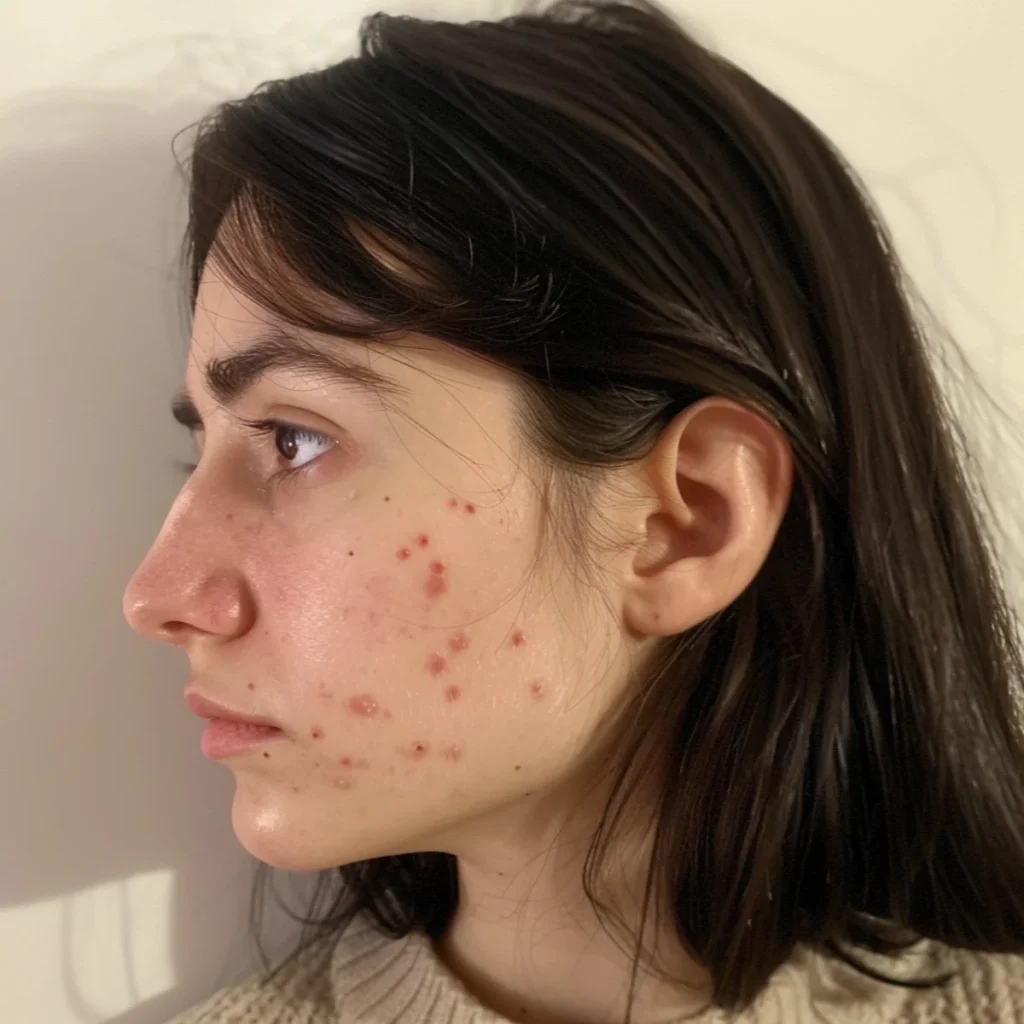Acne is one of the most common skin conditions, affecting millions worldwide.
While often associated with teenagers, acne can impact individuals of all ages. At St. Louis Dermatology & Cosmetic Surgery, we regularly see patients struggling with acne and its effects on their skin and self-esteem.

Defining Acne
Acne, medically known as acne vulgaris, is a chronic inflammatory skin condition when hair follicles become clogged with oil and dead skin cells. This blockage can lead to various types of blemishes, including pimples, blackheads, whiteheads, and, in more severe cases, nodules and cysts.
Causes of Acne
Several factors contribute to the development of acne:
- Excess oil production: Your skin’s sebaceous glands produce an oily substance called sebum. When too much sebum is produced, it can clog pores and lead to acne.
- Dead skin cells: As your skin naturally sheds dead cells, they can mix with sebum and clog pores.
- Bacteria: Propionibacterium acnes (P. acnes) is a type of bacteria that lives on the skin. When trapped in clogged pores, it can multiply rapidly, causing inflammation and acne.
- Hormones: Hormonal changes, particularly during puberty, pregnancy, and menstrual cycles, can increase sebum production and contribute to acne.
- Diet: While the relationship between diet and acne is still being studied, some research suggests that certain foods, particularly those high in refined sugars and dairy, may exacerbate acne in some individuals.
- Genetics: A family history of acne can increase your likelihood of developing the condition.
- Stress: While stress doesn’t directly cause acne, it can worsen existing breakouts.
Types of Acne
Acne manifests in various forms, including:
- Whiteheads: Closed, clogged pores that appear as small, flesh-colored bumps.
- Blackheads: Open, clogged pores that appear dark due to oxidation of the trapped sebum.
- Papules: Small, red, tender bumps without a visible center.
- Pustules: Red, tender bumps with a white, pus-filled center.
- Nodules: Large, solid, painful lumps beneath the skin’s surface.
- Cysts: Deep, painful, pus-filled lumps can cause scarring beneath the skin.
Acne can occur on various parts of the body, including the face, neck, chest, back, and shoulders – areas with a higher concentration of sebaceous glands.
Treatment Options
At St. Louis Dermatology & Cosmetic Surgery, we offer a range of treatments tailored to each patient’s specific type and severity of acne. Some common treatment options include:
- Topical treatments: Over-the-counter and prescription creams, gels, and lotions containing benzoyl peroxide, salicylic acid, or retinoids can help unclog pores and reduce inflammation.
- Oral medications: For more severe cases, oral antibiotics may be prescribed to fight bacteria and reduce inflammation. Hormonal treatments, such as birth control pills, can be effective for some women.
- Isotretinoin: This powerful oral medication is reserved for severe, resistant acne cases. Close monitoring is required due to potential side effects.
- Chemical peels: These treatments can help exfoliate the skin, unclog pores, and improve skin texture.
- Light and laser therapies: These advanced treatments can target acne-causing bacteria and reduce inflammation.
- Extraction: Professional extraction by a dermatologist can provide immediate relief for stubborn blackheads and whiteheads.
Preventing Acne
While not all acne is preventable, there are steps you can take to minimize breakouts:
- Maintain a consistent skincare routine, cleansing your face twice daily with a gentle, non-comedogenic cleanser.
- Use oil-free, non-comedogenic moisturizers and sunscreens.
- Avoid touching your face unnecessarily, and clean items that frequently come into contact with your skin, such as your phone and pillowcase.
- Don’t pick or squeeze pimples, as this can lead to further inflammation and potential scarring.
- Manage stress through relaxation techniques, exercise, and adequate sleep.
- Consider dietary modifications if you notice certain foods trigger breakouts.
When to See a Dermatologist
If over-the-counter treatments aren’t effective, or if your acne is severe, persistent, or causing emotional distress, it’s time to consult a dermatologist. At St. Louis Dermatology & Cosmetic Surgery, our expert team can develop a personalized treatment plan to help you achieve clearer, healthier skin.
Remember, acne is a common and treatable condition. With the right approach and professional guidance, you can effectively manage your acne and regain confidence in your skin. Don’t let acne control your life – reach out to us today to start your journey towards clearer skin.
GET IN TOUCH
